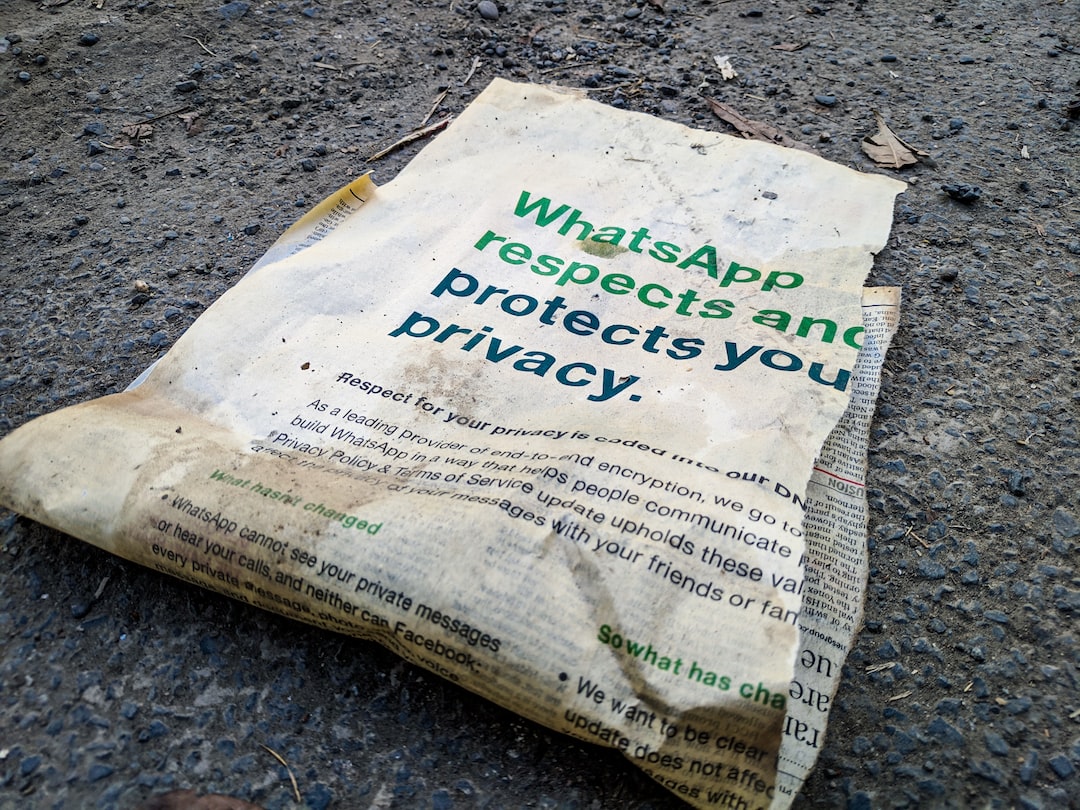WhatsApp is a popular messaging app that allows users to send text messages, make voice and video calls, and share media files with their contacts. With over 2 billion monthly active users worldwide, WhatsApp has become an essential communication tool for individuals and businesses alike. However, as the app collects and stores user data, ensuring data privacy has become a significant concern for users.
Data privacy refers to the protection of personal information and the control individuals have over how their data is collected, used, and shared. In the context of messaging apps like WhatsApp, data privacy is crucial because users often share sensitive information such as personal conversations, photos, and videos. Therefore, it is essential for WhatsApp to prioritize data privacy to maintain user trust and ensure the security of their information.
Key Takeaways
- WhatsApp collects and processes user data, which raises concerns about data privacy.
- There are various regulations and laws that govern data privacy, such as GDPR and CCPA.
- WhatsApp has implemented measures to protect user data, such as end-to-end encryption and data transparency.
- User consent is crucial in ensuring data privacy, and WhatsApp has provided options for users to control their data.
- Data breaches and cybersecurity risks are potential threats to data privacy in WhatsApp, and it is important to have a plan in place to manage them.
Understanding the Regulatory Landscape of Data Privacy
Data privacy regulations vary around the world, with different countries implementing their own laws to protect user data. For example, the European Union’s General Data Protection Regulation (GDPR) sets strict guidelines for how companies handle personal data of EU citizens. Similarly, the California Consumer Privacy Act (CCPA) provides Californian residents with certain rights regarding their personal information.
WhatsApp complies with these regulations by implementing measures to protect user data and ensure transparency in its data practices. The app provides users with control over their data through features such as end-to-end encryption and options to manage data sharing with Facebook, its parent company.
The Role of WhatsApp in Data Privacy
WhatsApp has made a commitment to prioritize user privacy by implementing various security features and encryption protocols. One of the key features of WhatsApp is end-to-end encryption, which ensures that only the sender and recipient can read the messages exchanged between them. This means that even WhatsApp itself cannot access the content of the messages.
In addition to encryption, WhatsApp also offers two-factor authentication (2FA) as an extra layer of security. 2FA requires users to provide a second form of verification, such as a fingerprint or a unique code, to access their WhatsApp account. This helps prevent unauthorized access to user accounts and protects their personal information.
Building Trust with Users through Transparent Data Practices
Transparency is a crucial aspect of data privacy, as it allows users to understand how their data is collected, used, and shared. WhatsApp is committed to being transparent about its data practices and provides users with clear information about what data is collected and how it is used.
WhatsApp’s privacy policy outlines the types of data collected, including user phone numbers, profile information, and device information. It also explains how this data is used to provide and improve the app’s services. Additionally, WhatsApp provides options for users to manage their data sharing with Facebook, giving them control over how their information is used for targeted advertising.
The Importance of User Consent in Data Privacy
User consent plays a significant role in data privacy. It ensures that individuals have control over their personal information and can make informed decisions about how their data is collected and used. WhatsApp obtains user consent for data collection and usage through its terms of service and privacy policy.
When users sign up for WhatsApp, they agree to the app’s terms of service and privacy policy, which outline the data collection and usage practices. Users have the option to review these policies before agreeing to them, ensuring that they are aware of how their data will be handled. This consent-based approach empowers users to make informed choices about their privacy.
Managing Data Breaches and Cybersecurity Risks in WhatsApp

Data breaches and cybersecurity risks are significant concerns for any app that collects and stores user data. WhatsApp takes several steps to prevent data breaches and protect user information. These include regular security updates, encryption protocols, and partnerships with cybersecurity firms.
WhatsApp also has a dedicated team that monitors for any suspicious activity or potential security vulnerabilities. In the event of a data breach or cyber attack, WhatsApp has a robust incident response plan in place to mitigate the impact and protect user data. This includes notifying affected users and taking immediate action to address the issue.
The Future of Data Privacy in WhatsApp: Trends and Challenges
The future of data privacy in WhatsApp is likely to be shaped by emerging trends and challenges. One trend is the increasing demand for privacy-focused messaging apps, driven by growing concerns about data privacy and security. This trend may lead to more stringent regulations and standards for messaging apps to ensure user privacy.
However, WhatsApp may also face challenges in maintaining data privacy, particularly as technology evolves and new threats emerge. Cybercriminals are constantly finding new ways to exploit vulnerabilities, and WhatsApp will need to stay ahead of these threats to protect user data effectively.
Balancing Data Privacy and Business Objectives in WhatsApp
While data privacy is crucial, WhatsApp also needs to balance it with its business objectives. As a free app, WhatsApp relies on targeted advertising and data sharing with Facebook to generate revenue. However, it is important for WhatsApp to find a balance between monetization and protecting user privacy.
WhatsApp has implemented measures to address this balance, such as providing users with options to manage their data sharing preferences. By giving users control over how their information is used for advertising purposes, WhatsApp aims to maintain transparency and respect user privacy while still supporting its business objectives.
Best Practices for Ensuring Data Privacy in WhatsApp
To ensure data privacy on WhatsApp, users can follow some best practices:
1. Keep the app updated: Regularly updating WhatsApp ensures that you have the latest security patches and features that protect your data.
2. Enable two-factor authentication: Two-factor authentication adds an extra layer of security to your account by requiring a second form of verification.
3. Be cautious of suspicious messages: Avoid clicking on suspicious links or downloading files from unknown sources, as they may contain malware or phishing attempts.
4. Review privacy settings: Take the time to review and customize your privacy settings in WhatsApp to ensure that you are comfortable with the level of data sharing.
For businesses using WhatsApp for customer communication, some best practices include:
1. Obtain explicit consent: Before collecting any customer data, obtain explicit consent and clearly communicate how the data will be used.
2. Implement data protection measures: Use encryption and other security measures to protect customer data from unauthorized access.
3. Regularly review and update privacy policies: Keep your privacy policies up to date and ensure that they accurately reflect your data collection and usage practices.
The Way Forward for Data Privacy in WhatsApp
Data privacy is a critical aspect of messaging apps like WhatsApp, given the sensitive nature of the information shared on these platforms. WhatsApp has made significant efforts to prioritize user privacy through encryption, transparency, and user consent. However, as technology evolves and new threats emerge, it is essential for WhatsApp to continue focusing on data privacy and adapting its practices to ensure the security of user information.
Users also play a crucial role in ensuring their own data privacy by following best practices and being cautious about sharing sensitive information. Similarly, businesses using WhatsApp for customer communication should prioritize data protection and obtain explicit consent from customers.
By working together, WhatsApp, users, and businesses can create a safer and more secure environment for communication while maintaining the privacy of personal information.
If you’re interested in learning more about data privacy in the WhatsApp landscape and how businesses can navigate regulations while building trust with their customers, check out this insightful article from MarTech. The article dives into the challenges businesses face when it comes to data privacy on WhatsApp and provides valuable tips on how to ensure compliance with regulations. Discover the importance of building trust with your customers and how it can positively impact your business. Don’t miss out on this must-read resource! Read more here.
FAQs
What is data privacy?
Data privacy refers to the protection of personal information from unauthorized access, use, or disclosure. It involves the collection, storage, and use of personal data in a way that respects an individual’s privacy rights.
What is WhatsApp?
WhatsApp is a messaging app that allows users to send text messages, voice messages, and make voice and video calls. It is owned by Facebook and has over 2 billion users worldwide.
What are the data privacy concerns with WhatsApp?
WhatsApp has faced criticism over its data privacy practices, particularly around its data sharing policies with Facebook. In 2021, WhatsApp updated its privacy policy to allow for more data sharing with Facebook, which led to concerns about how user data would be used and protected.
What regulations govern data privacy in the WhatsApp landscape?
Data privacy regulations vary by country, but some of the most well-known include the General Data Protection Regulation (GDPR) in the European Union and the California Consumer Privacy Act (CCPA) in the United States. WhatsApp must comply with these regulations when handling user data.
How can users protect their data privacy on WhatsApp?
Users can protect their data privacy on WhatsApp by enabling two-factor authentication, being cautious about sharing personal information, and regularly reviewing and updating their privacy settings. It is also important to read and understand WhatsApp’s privacy policy and terms of service.

